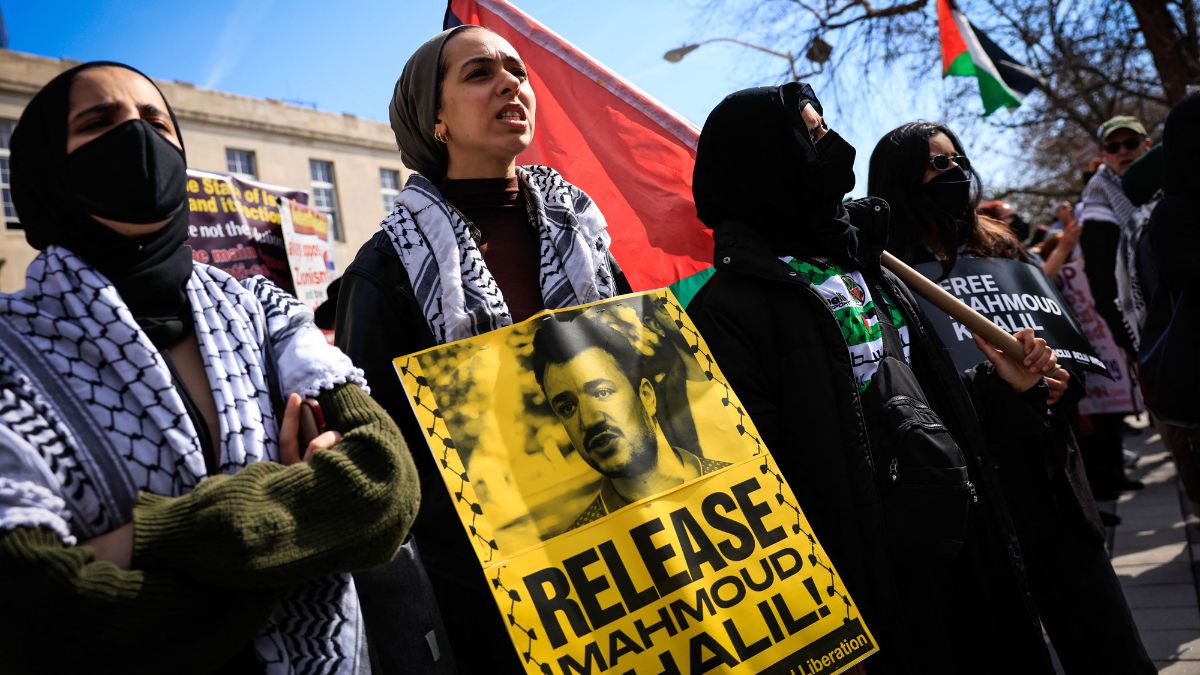Mahmoud Khalil: Pro-Palestine green card holder can be deported, rules immigration judge
 People hold signs as they participate in a protest in support of Columbia University student activist Mahmoud Khalil while a hearing takes place, outside the court in Newark, New Jersey | AFP
People hold signs as they participate in a protest in support of Columbia University student activist Mahmoud Khalil while a hearing takes place, outside the court in Newark, New Jersey | AFP
A Louisiana immigration judge ruled on that Mahmoud Khalil, a legal permanent resident (green card holder) and Columbia University graduate, could be deported from the United States. The decision by Judge Jamee E. Comans came after arguments from the federal government that Khalil’s presence in the US would have serious foreign policy consequences. The case has attracted worldwide attention as it challenges the limits of free speech protection provided by the American constitution and also the unbridled power enjoyed by the government in immigration issues.
For instance, Judge Comans ruled solely on the merits of the evidence presented by the federal government, which included a memo from Secretary of State Marco Rubio. The memo said Khalil’s “beliefs, statements or associations” compromised American foreign policy interests, specifically citing his involvement in pro-Palestine advocacy.
During a charged hearing in Jena, Louisiana, Khalil’s defence team argued that the allegations were vague and violated his constitutional right to free speech. They asked the judge to allow them to cross-examine Rubio and requested a delay to review the evidence, but both motions were denied by Judge Comans. She ruled that Rubio’s memo constituted “presumptive and sufficient evidence” and that immigration courts and even the attorney general lacked the authority to challenge the secretary of state’s determinations on foreign policy matters.
Khalil, who was arrested in March outside his university residence in New York, has been detained in a Louisiana facility, far from his pregnant wife, Noor Abdalla, a US citizen. His case gained attention due to his role as a negotiator for student protesters during Columbia University’s encampment last spring against the Gaza war. Rubio’s memo alleges that Khalil’s participation in “antisemitic protests and disruptive activities” endangering the safety and well-being of Jewish students. Khalil’s defence team raised the point that the accusations and Judge Coman’s determination relied only on his Khalil’s political expression.
Judge Comans’ decision hinges on the legal framework that grants significant authority to the secretary of state in immigration cases involving foreign policy. She said that Congress did not intend for immigration judges to overrule such determinations, effectively limiting the court’s ability to address constitutional concerns.
Khalil’s attorneys described the ruling as a dangerous precedent, arguing that it allowed the government to target even green card holders for their political beliefs. “Despite the government’s failure to prove that Mahmoud broke any law, the court has decided that lawful permanent residents can have their status revoked for pro-Palestine advocacy,” said the lawyers at a press conference.
The hearing was emotionally charged, with Khalil clutching prayer beads as the Department of Homeland Security made its case. After the ruling, Khalil criticised the court, referencing Comans’ earlier statements about the importance of due process and fairness, which he argued were absent in his case. His wife, Abdalla, called him a “political prisoner,” asserting that his detention was a direct result of his advocacy for Palestinian rights.
Khalil’s legal team plans to appeal the decision, with further immigration hearings expected before a potential review by the Board of Immigration Appeals. Meanwhile, a separate case in a New Jersey federal court is addressing the legality of Khalil’s arrest and detention.
Federal District Court Judge Michael Farbiarz is considering whether he has jurisdiction over claims, including a habeas corpus motion and requests for Khalil’s release on bail or transfer back to New York. Khalil’s attorneys are seeking a preliminary injunction to secure his release while his immigration case proceeds.
The government has also raised secondary allegations, accusing Khalil of paperwork errors in his application for permanent residency. These claims involve his alleged failure to disclose affiliations with organisations, including a United Nations agency aiding Palestinian refugees. Khalil’s legal team say these are done only to bolster the deportation case.
As executive branch employees, immigration judges are unlikely to challenge deportation efforts, especially in the prevailing political environment, and Judge Comans’ ruling reflects the constraints of their jurisdiction. She clearly stated that the court could not entertain constitutional challenges to the law, nor could it compel Rubio to testify. Critics argue that this framework grants unchecked power to the secretary of state, enabling deportations based on subjective interpretations of foreign policy interests.
Middle East